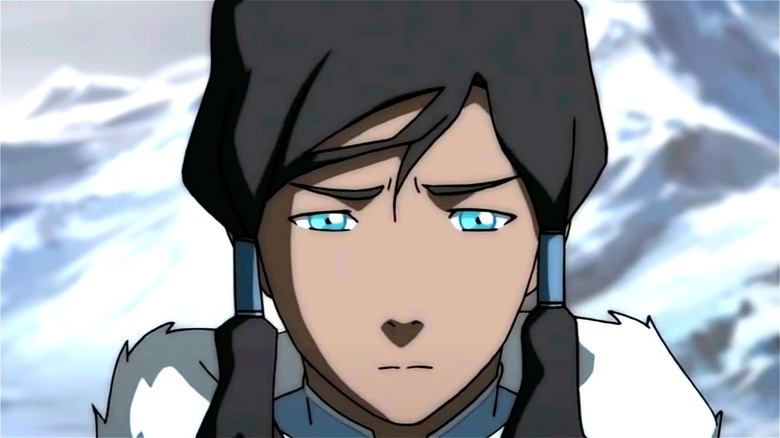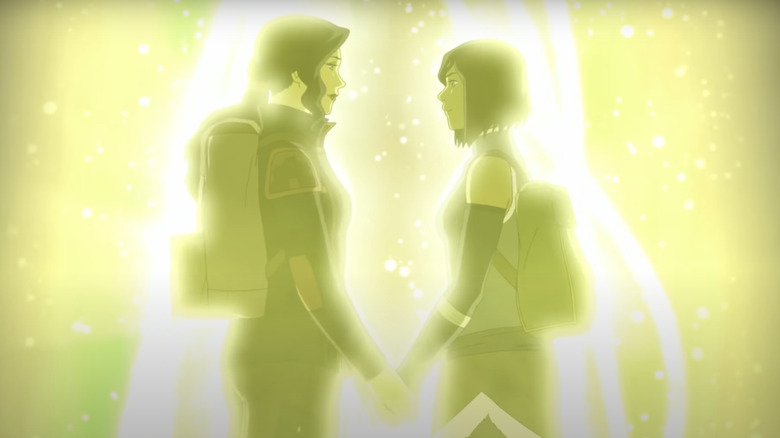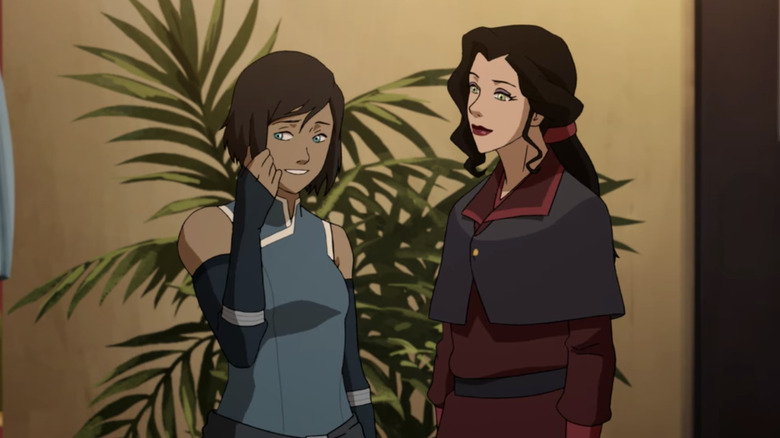The Legend Of Korra's Creators Faced Backlash Over This Plotline
Unlike its predecessor "Avatar: The Last Airbender," "The Legend of Korra" has often been the subject of unfair criticism. Taking place after Aang's death, "Korra" follows the titular new Avatar (Janet Varney) — the only one who is able to wield all four elements. But while many fans consider "Avatar: The Last Airbender" as one of the best animated shows ever, "Korra" was not given the same treatment.
Originally airing in 2012, "The Legend of Korra" was criticized for the concept alone. Not only was Korra unpopular for her gender, but many were disappointed with her character. Most notably, fans were upset that she wasn't Aang. As Wired pointed out, many pinned Korra as just a "surly teenage girl" who had no hopes of living up to the previous lead character's legacy; the site also accused these fans of being sexist in liking male characters for the same reason they dislike Korra. But aside from that controversy, series creators Michael Dante DiMartino and Bryan Konietzko were previously attacked for their handling of a significant plot point.
Many thought Korra and Asami's relationship was fan service
The finale of "The Legend of Korra" broke many barriers and can be considered one of the best episodes of the show. After years of friendship and fighting side by side, Korra and Asami become official. In the last scene of the show, the two walk into the Spirit World, hand in hand. If that wasn't enough confirmation for fans, Korra and Asami are also featured post-show in the comics as being in a committed relationship (via Newsweek).
Though it was among the first examples of two female characters in a romantic relationship on an animated series, not everyone was pleased. Den of Geek described how so many viewers called this "fan service," and how they felt the creators were just trying to check a diversity box when making the two leads LGBTQ+. While couples such as Mako and Asami and Katara and Aang were fully embraced by the community, the one instance of LGBTQ+ representation was clearly not.
Meanwhile, the creators were fully aware of this backlash and had no time for toxic fans. Konietzko, in particular, had some thoughts of his own on the subject.
The creators continue to support their decision
There is no world where Asami and Korra would have gone down differently. In the wake of the finale, the creators of "Korra" have made that clear. Though the couple was not intended to be together since the beginning of the series, that doesn't mean that the story didn't develop naturally. On his blog, Konietzko laid out how the story came to be. "I love how their relationship arc took its time, through kindness and caring," he wrote. "If it seems out of the blue to you, I think a second viewing of the last two seasons would show that perhaps you were looking at it only through a hetero lens."
Konietzko also seemed baffled by the accusation of "fan service." Many relationships on television are the result of chemistry between the actors and how the story progresses. "There is the inevitable reaction, 'Mike and Bryan just caved in to the fans,'" Konietzko continued. "Well, which fans? There were plenty of Makorra shippers out there, so if we had gone back on our decision and gotten those characters back together, would that have meant we caved in to those fans instead?"
As disappointed as Makorra shippers — and even still, Zutara shippers — are, it can be argued that "The Legend of Korra" had one of the most touching finales in television. The episode was important for representation as well as the progression of Korra and Asami as characters.


